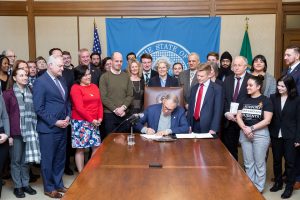Come to an 11th LD Town Hall this weekend!
Mini Town Halls
Listening to you is important to me, and email and telephone calls can’t replace talking to someone in person. That’s why I’m hosting two mini town halls on Sunday, February 23 with Rep. Zack Hudgins. The first will be from 10:00 a.m. to 12:00 p.m. at All City Coffee (205 S. Vale St.) in Seattle. The second will be from 1:00 p.m. to 3:00 p.m. at Refuel Café (401 Olympia Ave NE) in Renton.
These mini town halls are about having real conversations with you. Each person wishing to participate signs up for a 15-minute time slot, and during that time has the chance to ask questions, comment on legislation, and tell us about their ideas to make Washington a better place to live and work.
How to sign up: Please email my legislative aide, Syd Locke, at syd.locke@leg.wa.gov or call the office at 360-786-7862 and we’ll set a time that works for you.
If you have things to say but can’t make it to the mini town halls, please feel free to email me at steve.bergquist@leg.wa.gov. I try to respond to every call, email and letter from a citizen in the 11th District.
It’s an honor and a privilege to serve as your representative, and I hope to see you soon!
Traditional Town Hall
I won’t be able to attend due to legislative budget meetings, however, the day prior to the mini town halls, Saturday, February 22, Rep. Hudgins and Sen. Bob Hasegawa are hosting a traditional town hall from 10:00 a.m. to 12:00 p.m. at Teamsters Local 117 (14675 Interurban Ave S) in Tukwila.
Honoring our Promise to Washington’s Students

There will be more than 750,000 job openings in Washington in the next few years, and there aren’t enough qualified applicants in the state to fill those jobs. That’s why last year, the Legislature passed the Workforce Education Investment Act, which makes public college tuition free for families that make up to $50,000 and provides partial financial aid for other low- and middle-income students. The investment also fully funds the Washington College Grant (formerly the State Need Grant), funds the Guided Pathways programs at our Community and Technical Colleges, and expands enrollment in high demand fields, such as nursing and engineering.
We’ve already seen the benefits in our community. For example, Renton Technical College has been able to accelerate their Guided Pathways work by hiring a new transfer adviser and an additional behavioral health counselor. The school is hiring three new nursing faculty and a new Dean of Nursing, and plans to hire more faculty in high-demand fields such as welding, precision machining, surgical technology, and computer sciences. In addition, since the Workforce Education Investment fully funds the Washington College Grant (WCG), every student who qualifies will receive a grant, including the nearly 300 students at Renton Technical College who qualified for, but didn’t receive a grant due to a lack of funding in previous years. These investments will help ensure local students have the opportunity to fill well-paying jobs in our region.
In fact, the Workforce Education Investment is working so well across the state that we have more students wanting to go to school or go back to school than we expected. That’s why the Legislature passed, and last week the governor signed, a bill to simplify and improve the way we collect the funding for these programs, making it easier for businesses to comply, and ensuring our state’s students have the access to this opportunity for a higher education.
People want to get the education they need for a good-paying job and we offered them a solution, a promise. Now we are honoring that promise.
Share your thoughts: Healthcare Survey
 Ensuring access to quality, comprehensive healthcare improves the quality of life for everyone in our communities. The Legislature is committed to enacting policies to expand access for every Washingtonian – young or old, rich or poor. However, there are many competing ideas about how to accomplish that goal.
Ensuring access to quality, comprehensive healthcare improves the quality of life for everyone in our communities. The Legislature is committed to enacting policies to expand access for every Washingtonian – young or old, rich or poor. However, there are many competing ideas about how to accomplish that goal.
In order to get a better sense of the healthcare needs in the 11th District, I’ve created a survey that asks what changes you’d like to see in our healthcare system and your opinion on a few of the policies being debated this session. You can click here or the button to take the survey, which should take less than five minutes of your time. Thank you and I look forward to your responses!
Results: Your thoughts on controversial bills
Thank you to those who participated in the controversial bills survey I sent out in my last newsletter!
I asked you to share your opinion on some of the controversial issues being debated this session. Your responses told me a lot about where our district stands on issues such as sexual health education, the death penalty, and firearm regulation. For more information, check out the 2020 Controversial Bill Survey results.
Providing Students Relief from Transcript Holds
Students with unpaid fines and fees who’ve had their transcripts put on hold or been blocked from registering for classes may soon be getting some relief thanks to two bills recently passed by the House.
The first, House Bill 1715, sponsored by Rep. Debra Entenman, addresses transcript withholding by school districts across the state. Currently, school districts can indefinitely withhold a student’s transcript and diploma if they have lost or damaged school property or have unpaid fines or fees. Once the student or their guardian has paid the money owed then their transcript must be released.
In many of these cases, the students could not afford the fine or did not know they owed money to the school district, and not being able to access their transcripts created barriers to higher education. This bill is designed to make sure that students are aware of any monetary damages that they owe and all their options for paying them off, such as waivers or community service. It also limits the amount of time that a school can withhold a student’s transcript or diploma to five years.
The second, House Bill 2513, sponsored by Rep. Vandana Slatter, addresses a similar issue at the collegiate level. It’s currently common practice for institutions of higher education to withhold transcripts and the ability to register for classes when a student has unpaid debts, including parking fees. Students may lose access to jobs or other opportunities based on the inability to get their transcript.
It doesn’t assist with repayment of debts to withhold an earned credential, and creating barriers to employment only exacerbates the problem. That’s why this bill would prohibit withholding a student’s official transcripts as a tool for debt collection, except for debt related to unpaid tuition fees. The bill also limits registration holds as a tool for higher education debt collection.
Both bills passed the House with bipartisan support and are now under consideration in the Senate.
Sincerely,

Rep. Steve Bergquist
